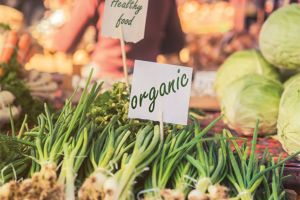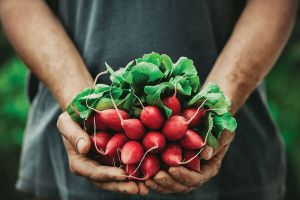Did you know that more than 60% of us in this planet are unwittingly ingesting loads of chemicals each day due the pesticides, herbicides, antibiotics and other chemicals used while growing our food? We haven’t even touched on processing and storing food yet!
While we’re all at risk, babies in their mother’s womb are at the most unfortunate end of this situation for their moms could be contributing to their future health issues. We hope you pay due attention to this, for it’s never too late to turn things around!
Chemicals are widely consumed in the form of pesticide residues on fruits, vegetables and crops. They can also be consumed through affected dairy, poultry, and meat products. For a pregnant woman, these chemicals can easily reach her growing fetus. Later on, it can also be passed to her baby via her breast milk.
The solution is not just healthy food, but organic food. This means food that has been grown or produced without the use of chemicals.
What organic food represents
Certified organic produce is grown without using harmful pesticides or synthetic fertilizers. Likewise, certified organic meats, eggs, poultry and dairy come from animals that are allowed access to the outdoors, and have not been given antibiotics and growth hormones. Such animals are only fed with organic feed.
The thing about organic food is, they’re not just good for your health and that of your unborn baby, but the whole practice of organic produce itself is beneficial for the environment and ultimately, our planet. Organic farmers use natural methods in all areas of farming such as crop rotation and pest management and avoid the use of toxic chemicals which can persist in the environment for years. This way, our water sources, land and air are protected from contamination.
Regardless of where it’s grown, organic foods have to meet with a set of standard to be certified as organic. During growing, handling and processing, there should be:
- No pesticides
- No chemical fertilizers
- No weed-killers
- Food also can’t be:
- Genetically modified
- Injected with or given hormones or antibiotics (for chicken, beef and pork)
While the availability of organic foods seems to be of little issue nowadays and there are organic sections found in most supermarkets, organic farms must however adhere to strict standards. The overall costs of food production and handling are higher compared to conventionally grown and produced food and this is ultimately reflected on the price tags of organic products. Hence, while it would be highly beneficial for pregnant moms to go fully organic, but not everyone can afford to do so.
You don’t have to go all organic
The health benefits of fruits and vegetables means that’s it’s unwise to omit them for the sake of avoiding pesticides, but since it’s not always possible for most pregnant moms to be eating organic, it’s always good to know how to make the best choices in foods. The Environmental Working Group, an American environmental organization that specializes in research and advocacy in the areas of toxic chemicals has identified two groups of fruits and vegetables according to their pesticide residues present in them. They are called the Dirty Dozen and the Clean 15.
The Dirty Dozen
The dirty dozen consists of foods which are most contaminated with pesticides and/or with pesticide residues which are difficult to clean off. Needless to say, it’s best to buy these from the organic section of your supermarket.
- Apple
- Peaches
- Nectarines
- Strawberries
- Grapes
- Celery
- Spinach
- Sweet Bell peppers
- Cucumbers
- Cherry tomatoes
- Snap peas
- Potatoes
The Clean 15
This list consists of fruits and vegetables that are the least contaminated with pesticides. As such, they need not be organic.
- Avocados
- Sweet Corns
- Pineapples
- Cabbage
- Onions
- Asparagus
- Mangos
- Papayas
- Kiwi
- Eggplant
- Grapefruit
- Cantaloupe
- Cauliflower
- Sweet peas (frozen)
- Sweet potatoes
Other foods that are best to buy organic are:
Meat. Organic meat means that the animal was grass fed, free from antibiotics and growth hormones. They are also generally lower in calories and fat. Organic meats are also believed to be higher in protein than other meats.
Poultry and eggs. Look for free-range poultry, for they are less likely to carry dangerous diseases from being kept in cramped, disease-breeding quarters.
Be smart about your food choices
As mentioned earlier, an exclusively organic diet may be out of the question for many, so here are some other ways that can help reduce your exposure to pesticides.
- Wash all fruits and vegetables before consuming or cooking. There are many safe, trustworthy products that can be used for this purpose.
- When using fruits that aren’t organic, always peel them first.
- Discard the outer leaves of foods like lettuce and cabbages before use.
- Pesticides accumulate in fatty tissues, so remove visible fat from meats and remove skin and fat from poultry too.
- Go for organic butter, cheeses and milk. Alternatively, you could go for low-fat versions.
Cook @ more often
If you’re in the habit of dining out, ordering in, or consuming processed packaged foods, it’s time you make a change for the better, for you can never be entirely sure what you’re eating if you keep doing so. Start preparing your own meals at home with fresh, whole ingredients for it gives you maximum control over what your eat.
That way, you can ensure an optimally safe and healthy diet during your pregnancy. On the long run, healthy cooking is after all a necessary parenting skill for all future baby food prep, school lunches, and more that you have waiting ahead of you. Practice now and be a pro in no time!
Contamination from the seas/waters
Fish contain omega-3 fatty acids, an important nutrient for both mom and baby’s heart and immune health and baby’s brain development, so it should be a good thing to include in your diet. The thing is, many types of fish in the supermarket or wet markets are contaminated with mercury, toxic industrial compounds (such as PCBs) and pesticides.
These are dangerous substances that can cause problems ranging from brain and nervous system damage to cancer, and they affect both mom and her baby. Safe fish choices for pregnant women include farmed trout or catfish and wild Alaskan salmon and halibut.


















